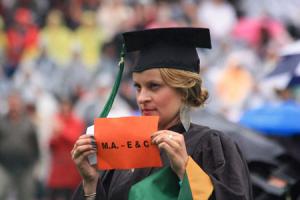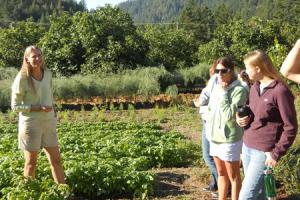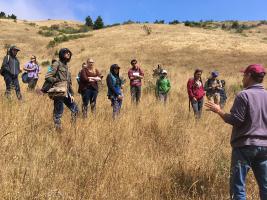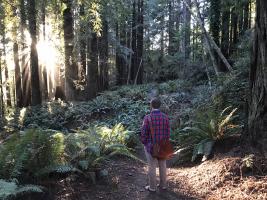Spring 2011
Jim Hight
February 10
“Climate Change Policy in North America: Reasons for Optimism”*
Watch full presentation
As senior editor of Climate Change Business Journal, Jim covers policies, markets and business models for renewable energy, energy efficiency and other technologies and practices for mitigating climate change. Jim has been a journalist for more than 30 years, writing for publications as diverse as the Boston Globe, Technology Review, High Country News and North Coast Journal.
Despite setbacks in the November 2010 elections, policies to cut greenhouse gas (GHG) emissions are advancing on multiple fronts in North America. Jim will discuss EPA rules targeting coal power plants and other large GHGemitters; new cap and trade policies in California, British Columbia, Ontario and Quebec; the RGGI cap-and-trade program in the Northeast; the status of the Western Climate Initiative and Midwest Greenhouse Gas Reduction Accord; stakeholder pressure on corporations to reduce emissions; and more.
Steven Hackett and Luke Scheidler
February 24
“The Economics of Clean Energy in Humboldt County”
Watch full presentation
Dr. Steven Hackett is in his 22nd year as a professor, 17 of which have been at Humboldt. He has published many scholarly works on the economics of the environment, natural resource, and energy, and his work has been supported by organizations including the National Science Foundation, NOAA, the California Energy Commission, the California Department of Fish and Game, and the Headwaters Fund. Recipient of the 2005 Humboldt Scholar of the Year award, Hackett is a member of the Energy, Environment, and Society graduate faculty and is a faculty research associate at the Schatz Energy Research Center. He is currently serving as interim Associate Dean for Professional Studies.
Luke Scheidler is a second year graduate student in the Energy, Environment, and Society program at Humboldt and a graduate research assistant at the Schatz Energy Research Center. He has been working closely with Dr. Hackett on the economic analysis component of the RESCO project, which has further developed his interests in local renewable energy development and energy efficiency. Luke received a BA in Biology from DePauw University and has a diverse research background ranging from the medical field to conservation biology.
Tom Fee, National Association of Environmental Conflict Resolution
March 2 (Wednesday, check back for location information)
“Leadership Patterns in Environmental & Public Policy Dispute Resolution 1970- 2010 – 2050: Reflections & Explorations”
Thomas A. Fee is a public policy mediator, lawyer, facilitator, leadership coach and futures design and implementation consultant. Over the past 30 years, Tom has worked with leaders at all levels to address and resolve a variety of complex, multiparty public disputes involving environment, healthcare, housing, emergency management, agriculture, transportation, civil rights, philanthropy, juvenile justice, education, eldercare, finance systems, reorganizations, and violence prevention. He has served as a confidential advisor and counsel to several dozen organizations and has worked on major systems design innovations such as the state office of mediation movement, court dispute resolution, and leadership mentoring locally, nationally and internationally. Tom is admitted to the Bar in New Jersey and earned a J.D. from Rutgers University’s School of Law, Newark where he was elected to the University Senate. He earned his B.A. with High Honors from Rutgers College.
Mary Crowley
March 10
“Solutions to Plastic Proliferation In Our Oceans”
Mary Crowley is co-founder of Project Kaisei, founded in 2008 to help stem the flow of plastic and marine debris into our ocean. Project Kaisei is building a global collaboration of science, industry, technology, innovation and policy to help bring about solutions to the way we treat waste in our daily lives, much of which finds its way to the sea. The Project has been recognized by the United Nations Environment Programme (UNEP) in 2009 as a Climate Hero for its collaborative work with Scripps Institute of Oceanography, by Google as a Google Earth Hero for its work with a video blogging voyage tracking system, and was recently part of the Clinton Global Initiative in September 2010. The 150 foot long Brigantine tall ship “Kaisei” is the project’s primary research vessel.
David Rubin
April 7
“The Challenges and Opportunities of Renewables from a Utility Perspective”
Watch full presentation
David Rubin is presently the Director of Service Analysis at Pacific Gas and Electric Company in San Francisco, where he has responsibility for economic development and distributed generation.
From 1982-1985, David was responsible for energy efficiency, cogeneration and district heating with the City and County of San Francisco. He joined PG&E in 1985, and spent seven years in the marketing and rates areas. He left PG&E in 1992 to join the International Energy Agency in Paris, France. While at the IEA, he had responsibility for electricity restructuring, energy efficiency and demand side management. During this period he participated in a number of energy sector studies throughout Europe and the former Soviet Union.
He returned to PG&E in 1995, and assumed his current job responsibilities in 1997. David is currently on the boards of the Solar Electric Power Association and SolarTech. His educational background includes a Bachelor of Science degree in civil engineering from the University of Maryland, and a Master of Science degree in engineering fromMIT. David is a registered mechanical engineer in California.
Judith Mayer
April 14
“Borneo to California and Back”
Dr. Judith Mayer will discuss how Borneo indigenous communities are facing critical dilemmas for their own futures, and the roles of international initiatives in their struggles for environmental justice. She will discuss her research about community land uses and resilience in Borneo, and highlight an American citizens’ effort to help communities defend their forests.
Dr. Mayer is an environmental planner with extensive experience in the US and Southeast Asia. She has been Coordinator and a founding member of The Borneo Project, a California-based organization helping Borneo communities defend their rainforests, sustainable livelihoods, and human rights since 1991. Investigating indigenous agroforestry systems, timber plantations, and land policies, Judith has been a visiting researcher at the Center for International Forestry Research (CIFOR), the Forestry Research Institute Samarinda, and Tanjungpura University (Indonesia). Judith has worked as a consulting planner for local, state, and federal agencies in the US, and serves on the City of Arcata’s Planning Commission. She has taught planning related courses at Virginia Tech and Cal Poly Humboldt. Judith holds a PhD in City and Regional Planning from the University of California, Berkeley, a MS in Urban and Regional Planning from the University of Wisconsin-Madison, and a BA in History from Swarthmore College.
Eric Holt-Giménez
April 21
“Food Rebellions: Crisis and the Hunger for Justice”
Eric Holt-Giménez, Ph.D., is the Executive Director of Food First/Institute for Food and Development Policy a “peoples’ think-and-do tank” dedicated to eliminating the injustices that cause hunger and environmental degradation. Previously, he worked as Latin American Program Manager at the Bank Information Center in Washington, D.C., where he monitored the projects and the policies of the World Bank and the Inter-American Development Bank. He has held positions as a lecturer in International Development and Agroecology at the University of California and Boston University’s Global Ecology program.
Throughout the 1970s, ‘80s and ‘90s, Dr. Holt-Giménez lived and worked in Latin America where he helped organize and train farm leaders in agroecology and was a consultant to non-governmental organizations, government ministries, and foreign aid agencies. In his path-breaking participatory research, “Measuring Farmer’s Agroecological Resistance to Hurricane Mitch,” 2,000 farmers documented the superior sustainability of agroecologically-managed farms to conventional farms in Central America. His first book, Campesino a Campesino, chronicles nearly thirty years work with Latin America’s Farmer to Farmer Movement for sustainable agriculture. In his recent book, Food Rebellions! Crisis and the Hunger for Justice, co-authored with Raj Patel and Annie Shattuck, Dr. Holt-Giménez proposes equitable, sustainable solutions to the root causes of the global food crisis. He holds a Masters of Science in International Agricultural Development and a Ph.D. in Environmental Studies.
Tim Palmer
April 27 (Wednesday)
“Rivers of America”
Tim Palmer is the award-winning author of 20 books on rivers, conservation, and the environment. He is also an accomplished photographer. Tim’s writing and photography work have braided together his love of rivers and nature with his drive for creative expression and his deep commitment to conservation. Tim worked for eight years as a land-use planner on land use and environmental topics from 1971-1980. He started to write full-time in 1980. Through his photographs and writings, he seeks to encourage a sense of love and commitment to natural places; to promote better understanding of natural systems and the threats to them; and ultimately, to inspire people to take action to protect the environment.






